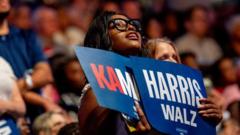In recent days, the University of Michigan's Ann Arbor campus buzzed with excitement as students prepared to cast their early votes. The warm autumn weather drew many young voters, including third-year student Keely Ganong, who expressed her admiration for Harris as a leader. "She’s just a leader that I look up to," said Ganong, emphasizing the importance of gender equality and a woman's right to choose.
Lola Nordlinger, another student, echoed these sentiments, stating, "A woman’s choice is something that’s so personal to her." This growing camaraderie among students regarding voting suggests a decisive wave of young voices may significantly impact the election results. Adrianna Pete, 24, who volunteers to educate students about voting, believes, "A lot of women are rising up."
Polling data indicates that Harris trends positively among female voters aged 18-29, leading with a substantial 30-point margin over her opponents. Among college students, Harris's support is even more pronounced, with a 38-point lead noted by the Inside Higher Ed/Generation Lab survey. As election day nears, the vice president's campaign is tailored towards rallying this crucial demographic.
At a recent Harris rally in Ann Arbor, Hannah Brocks shared her enthusiasm: "I just like the way she talks about people in general. There’s so much love and empathy." Her involvement in local Democratic efforts underscores a broader trend: young women gearing up to participate actively in this election cycle.
Exit polls predict a similar turnout trend as seen in 2020, where voter demographics shifted towards women significantly, with early voting indicating a breakdown of about 55% women to 45% men. However, this year presents a nuanced challenge for Harris as her appeal among younger, non-white women exceeds that of white women — an aspect evident in polling history.
The Republican Party has retained a degree of trust from many white women voters concerning issues like immigration and the economy. If Harris aims to capitalize on voter participation, she will need to broaden her appeal to those women as well, persuading them with abortion rights as a pivotal issue.
In Arizona, the stakes are high with a constitutional amendment regarding abortion rights on the ballot. Mary Jelkovsky, a 26-year-old advocate for reproductive rights, believes this could amplify female voter turnout, bringing a potential blue wave with it.
Amid these evolving dialogues about abortion, women like Rebecca Gau describe voting for Harris as a representation of practical American values that transcend political boundaries. However, not all women are on board with Harris; some individuals share reservations about her stance on abortion rights, displaying a divide within the female electorate.
As Harris's team works to unite and mobilize these women, the election outcome remains a pressing matter, with analysts keenly observing how this engagement will sway voter sentiment in crucial battleground states.
Lola Nordlinger, another student, echoed these sentiments, stating, "A woman’s choice is something that’s so personal to her." This growing camaraderie among students regarding voting suggests a decisive wave of young voices may significantly impact the election results. Adrianna Pete, 24, who volunteers to educate students about voting, believes, "A lot of women are rising up."
Polling data indicates that Harris trends positively among female voters aged 18-29, leading with a substantial 30-point margin over her opponents. Among college students, Harris's support is even more pronounced, with a 38-point lead noted by the Inside Higher Ed/Generation Lab survey. As election day nears, the vice president's campaign is tailored towards rallying this crucial demographic.
At a recent Harris rally in Ann Arbor, Hannah Brocks shared her enthusiasm: "I just like the way she talks about people in general. There’s so much love and empathy." Her involvement in local Democratic efforts underscores a broader trend: young women gearing up to participate actively in this election cycle.
Exit polls predict a similar turnout trend as seen in 2020, where voter demographics shifted towards women significantly, with early voting indicating a breakdown of about 55% women to 45% men. However, this year presents a nuanced challenge for Harris as her appeal among younger, non-white women exceeds that of white women — an aspect evident in polling history.
The Republican Party has retained a degree of trust from many white women voters concerning issues like immigration and the economy. If Harris aims to capitalize on voter participation, she will need to broaden her appeal to those women as well, persuading them with abortion rights as a pivotal issue.
In Arizona, the stakes are high with a constitutional amendment regarding abortion rights on the ballot. Mary Jelkovsky, a 26-year-old advocate for reproductive rights, believes this could amplify female voter turnout, bringing a potential blue wave with it.
Amid these evolving dialogues about abortion, women like Rebecca Gau describe voting for Harris as a representation of practical American values that transcend political boundaries. However, not all women are on board with Harris; some individuals share reservations about her stance on abortion rights, displaying a divide within the female electorate.
As Harris's team works to unite and mobilize these women, the election outcome remains a pressing matter, with analysts keenly observing how this engagement will sway voter sentiment in crucial battleground states.





















